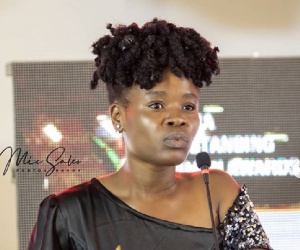Opinions of Sunday, 13 June 2004
Columnist: Akosah-Sarpong, Kofi
The Trial Of Irrationality In West Africa
"If a particular spot on the road is causing accidents the traditional thinking is that evil spirits or ghosts are operating there and must be exorcised. We spent resources to slaughter sheep and goats and pour libation as a way of driving away the evil spirit to prevent the accidents. But quite often the problem persists." -- Prof. Kasim Kasanga, Ghana?s Minister of Environment and Science, recalling how superstitious beliefs dominated road construction
From Kwame Nkrumah?s Ghana to Sekou Toure?s Guinea to Samuel Doe?s Liberia the issue of culture and development, especially deadly superstitious beliefs, have never been at the center of West Africa?s development discourse till now. Samuel Doe himself was so rooted in deadly superstition that he blew his country into pieces. Sekou Toure and Nkrumah projected images of mystery. Today?s Big Men should move away from such practices so as to minimize the influence of unnecessary superstition in the development process. From Ghana to the Gambia to Nigeria there appears to be ferment of attacks against certain superstitions that for long was ignored in the region?s development process.
This is 2004 and West Africans need a new mindset and new thinking informed by their experiences, culture and history. West Africans live in new challenges and new dangers, some of which emanate from within their culture, unknown to them has led them lead a dim life. The Liberian rebel kid who straps himself with juju-marabou paraphernalia against bullets and evil forces but killed later is as stupid as the juju-marabou medium who gave him the talismans and other charms and potions. The juju-marabou medium that aids an armed robber and a coup plotter is as dangerous as the implications of poverty in stability. For long, West African elites have not understood their societies for development, now they are beginning to and this is expected to influence policy development, most of which currently do not reflect the values of their societies.
Much of the reason for the sharp rise of attacks against certain cultural values that are today deemed to be counter-productive to West Africa?s development is the fact that the region is rated by the UN as the poorest in the world; Nigerian defence researchers have revealed that of the 37 successful coup detats in Africa 32 have occurred in West Africa (making the region the most unstable in Africa); and security experts have concluded that nearly all of the most horrendous civil wars, communal violence, high profile corruption cases and crimes in Africa have occurred in West Africa. Most of these troubles are rooted in West African culture. That witchcraft and other negative cultural values have been disturbing Guinea Bissau is as true as the same values making Liberia a mess. It is, therefore, not surprising to hear Ghana?s Minister of Environment and Science, Prof. Kasim Kasanga saying that irrational ways of solving problems based on superstition has become the biggest obstacle facing the Ghana (and by extension West Africa). He, therefore, called for the adoption of scientific methods of explaining problems rather than relying on superstition. "The challenges facing the nation today was to transform the minds, attitudes and behaviours in our society to appreciate scientific approach to doing things."
Unsatisfied with the excessive blame of colonialism for West Africa?s despicable state of affairs, thinkers such as Ghana?s George Ayittey and Nigeria?s Wole Soyinka have argued for a look at internal values that have been inhibiting the region?s progress. Ayittey has gone to the extent of coining ?Africa?s solution for Africa?s problems.? It is in this spirit that the increasingly open West African journalists and a generation of elites have reflected upon certain cultural values that for long have been blocking West Africa?s progress. Anthropologists and development experts reveal that the high incidence of witchcraft, juju, marabou and other native spiritual mediums in West Africa have been impacting on the region negatively to the extent that poverty-alleviation and democratization are under threat from such cultural values. Voodoo, bad or good, is only practiced in West Africa. Juju is heavily a West African value. Marabou (otherwise called Alpha-man in Sierra Leone and Malam or Kramo in Ghana or Aboki in Nigeria) is highly rooted and scattered in West Africa). There is also high incidence of witchcraft in West Africa than any other part of Africa. And all these have been entangling West Africa?s development.
From coup plotters to armed robbers to pickpockets to family crises all these negative cultural values have been employed to the detriment of stability and progress, creating a society of mistrust and weak civic virtues. Apart from all these certain cultural beliefs such as obsession with the dead to the extent of spending more money on the dead than living conditions and the interpretation of all misfortunes on witchcraft, the mixture all these inhibiting cultural values and poverty has resulted in a West African developmental trouble. Aware of such negative cultural values there have seen a remarkable boom in spiritual churches across West Africa most of whom mix juju and other native spiritism with Christian values, a dangerous mix that has increased negative superstition, undermined development and blinded West Africans from reality in terms comprehending their problems in clear terms, West African elites and the media are waging campaigns against such inhibiting values.
It is in this regard that in Nigerian broadcasters are no longer allowed to show miracles on television in a way that are not "provable and believable.? Nigeria?s National Broadcasting Commission (NBC), regulators of the country?s media, says television stations that fail to abide by the ruling will be fined, and their equipment could be confiscated. The NBC, drawing from the of wave media attacks against deadly superstition and irrationality like other parts of West Africa, says some of the miracles shown on television and other media outlets, are false and TV stations can broadcast miracles only when they are verifiable. This may sound contentions but help clear the heads of the gullible and the irrational. Like other parts of West Africa, many of the spiritual churches claim to cure diseases, overturn court cases, others to bring wealth and happiness. Zambia?s former President Frederick Chuluba when he was President visited Nigerian spiritual churches secretly for spiritual help ostensibly against his looming corruption cases, an indication of such churches aiding mal-development.
But the question of how a miracle can be verified has not been answered. Few would assume the power to judge whether or not a miracle is genuine. In a bid that is expected to brighten the development terrain, members of the Christ Embassy, one of the largest spiritual churches in Nigeria and West Africa, which used to show healing services, have now gone to court to challenge the NBC, which aims to rationalize an irrational society. Before this, the Nigeria media have described their country as the ?devil?s den,? a reference to a country mired in irrationality, human sacrifices, ritual murders, fearsome juju-marabou practices and the impact of all these on the stability of the country. Gen. Sani Abacha revealed how juju-marabou mediums have been undermining the stability of Nigeria.
As the trial of irrationality gains momentum regionally, West Africans are hearing from the UN War Crimes Tribunal in Freetown how juju-marabou mixed with drugs, a deadly potent, saw some 500,000 Sierra Leoneans murdered, beheaded, maimed, raped and mutilated in the country?s decade long civil war (rebel leader Foday Sankoh was so much juju-marabou drenched that he believed he could vanish into thin air and that no bullet could penetrate through him. He was involved in massive human sacrifices and ritual murders). In Liberia juju-marabou defined the rebels mission. War-lord turned president Charles Taylor has been accused by both his associates and publications of gruesome human sacrifices and ritual murders (West Africans will get know more as attempts are being made to arrest him from his Nigerian exile and trial him. Taylor cannot escape from Nigeria as he has already been indicted in Europe, Africa and Asia.). The crime against humanity trial in Freetown demonstrates what Prof. Kasim Kasanga indicates that we use scientific method to analyze problems holistically. In Freetown the influence superstition on the decade long horrifying civil war is on trial holistically.
Informed by such atrocious and irrational regional juju-marabou induced developments, Ghanaian elites and the media, like their Gambian and Nigerian pals, have been waging campaigns against values deem inhibiting the development process. (The Accra-based Chronicle has reported how Togolese opposition figures employed Ghanaian voodoo to kill President Eyadema.) The elites have enjoined Ghanaians to eat well in order to think well so as not blame misfortunes on witchcraft. They have asked Ghanaians to spend more money on their living conditions instead of on the dead. They have asked Ghanaians to think well about their problems instead of relying too much on prophecies from the spiritual churches. The Ghana Police Service, aware of the impact of juju-marabou on crime, now sees juju-marabou mediums as criminal facilitators. Agriculture Minister, Major Courage Quarshigah (rtd), one of the leading elites, have gone further by challenging Ghanaian and African researchers to tinker with their cultural values in order to improve their development process. In a move reminiscent of the European Enlightenment era, which used reason to demolish entrenched deadly superstitions, Ghanaian scientists are currently working on strategies that would help explain things rationally, based on facts and given reasons, and are also mapping out strategies for science acculturation in order to minimize the degree of irrationality in the Ghanaian society. Aware of the implications of deadly superstition on their country, Liberian women have been demonstrating against the ritual murders of their children. Considering the increasing integration of the sub-region the anti-superstition campaigns by the Ghanaian and other West African intelligentsia and civil society is expected to influence the sub-region against inhibitions within their culture.
Unnecessary superstition have dominated the lives of West Africans since ancient times so much so that even a defeat in a football game was explained off in superstitious terms while ?the real technical problems were neglected.? In Freetown, anything that happens is said to be the ?na God mark am? (a fatalistic belief that means it is God?s design. In this view a road accident is Na God mark am and not a mechanical problem or the driver?s mistake). It is therefore not surprising to hear Ghana?s Dr Joseph O. Gogo saying that the under- development of Ghana and West Africa is due to the ?low level of science acculturation in the system.?
Despite the anti-superstition campaigns by West African media and the elites more work need to be done in this front against West African stupidity, stupidity informed by the region?s culture that has seen the region easily used by the Libyan leader Murmur Ghaddafi to cause cruel civil wars and general instability (Ghaddafi not only bankrolled West African insurgents and coup plotters but also trained Sierra Leone?s Foday Sankoh and Liberia?s Charles Taylor and their associates to cause one of the most terrible civil wars in Africa and aided coup plotters such as Ghana?s Jerry Rawlings, himself by his own accounts a rabid juju-marabou dabbler).
West African elites, the media and civil society should continue to campaign against such cultural practices, drawing from the region?s experiences, culture and history, and help refine the inhibiting aspects of their culture for the good of the development process. The media and the elites should undertake more interpretative/commentative work in terms of the culture and the development process in their public education services.












